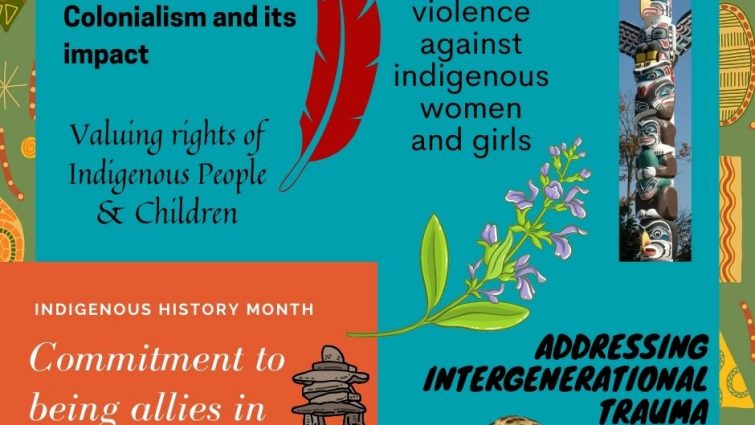In June, Canadians celebrate National Indigenous History Month to honour the history, heritage and diversity of Indigenous peoples in Canada. It is also an opportunity to recognize the strength and resilience of present-day Indigenous communities. National Indigenous History Month is a time for learning about, appreciating and acknowledging the contributions First Nations, Inuit and Métis people have made in shaping today’s Canada.
On June 21 2021 it is also National Indigenous Peoples Day and this year marks the 25th anniversary of celebrating the history, heritage, culture, and achievements of Indigenous communities across Canada. These celebrations and acknowledgements seem superficial given the continuous historical, and or recent and current injustices, inequities the community continues to experience in Canada. The recent news of the remains of 215 Indigenous babies being found in a mass grave at Kamloops Indian Residential School is not only horrific and traumatizing, but a testament to government and systems failure.
These children were under the “care” of school staff, the churches, and the Canadian federal government who collectively are responsible for the loss of lives (these and others yet not found) due to maltreatment, systemic racism and discrimination as well as physical, spiritual, cultural and emotional abuse of these 215 Indigenous children and likely many more. According to the Truth and Reconciliation report released in 2015, the creation of the Residential schools was a “systematic, government-sponsored attempt to destroy Indigenous cultures, languages, and assimilate Indigenous peoples so they no longer existed as distinct peoples.” (The Final Report of the Truth and Reconciliation Commission of Canada Volume 4 2015).
Indigenous communities across the nation have and continue to face significant challenges, and barriers to acceptance and inclusion. The lack of reporting and appropriate action on the missing and murdered Indigenous girls and women, the lack of clean drinking water on reserves, and the inequitable opportunities for justice within the various oppressive systems in society continue to be issues that require all of our united advocacy and accountability. Witnessing these tragedies has encouraged us as a federally incorporated charitable non-profit organization based in Peel Region, to continue to be committed to building anti-racism anti-oppression (ARAO) – diversity equity inclusion (DEI) competency in the human services sector to support breaking through the legacy of trauma and hate that pollutes our framework as a nation. We as settlers at the Regional Diversity Roundtable (RDR) acknowledge the land we live, work, and learn on as the land that belongs to the Indigenous peoples of Canada. We are settlers and allies with a call and responsibility to respect, acknowledge, and advocate for our Indigenous communities as we continue to occupy the land.
References: The Final Report of the Truth and Reconciliation Commission of Canada (2015) Volume 4 Canada’s Residential Schools: Missing Children and Unmarked Burials http://www.trc.ca/assets/pdf/Volume_4_Missing_Children_English_Web.pdf
Government of Canada (2021) National Indigenous History Month and National Indigenous Peoples Day. https://www.rcaanc-cirnac.gc.ca/eng/1100100013248/1534872397533
